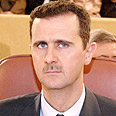
Even after Benjamin Netanyahu's blooper, we still don't know what happened on September 6 in northern Syria.
According to a Washington Post editorial from September 20, media repots are converging on the story that Israel attacked a facility that it believed contained nuclear materials or infrastructure, attained with the assistance of North Korea. In the discussion among analysts, focus is not mainly on what we know or don't know – because there are no clear and/or official versions from either Israel or Syria – but rather about what makes sense and what doesn't with regard to the reports that have come out in the international press.
Some arms control experts in the US have posted rather strong reactions aimed at undermining the validity of some of the early reports. The main issue that concerns them is the talk about Syrian-North Korean cooperation in the nuclear field. They don't buy it. But the context of their opposition is not Middle Eastern dynamics and realities, but rather the domestic political debate in the US, referring back to the decision to go to war in Iraq.
Thus, as posted on the blog of Foreign Policy on September 14, nonproliferation expert Joseph Cirincione claims that the story published in the Washington Post the day earlier about Syrian-North Korean nuclear cooperation "is nonsense".
The reason? The Syrian nuclear program is miniscule and any assistance from North Korea short of nuclear weapons would be insignificant. The conclusion? The story is a repeat of the run-up to the war in Iraq. This time, facts leaked to the press about Syrian-North Korean nuclear cooperation were intended to derail the US-North Korean agreement that some hardliners in the administration view as appeasement.
The problem is that – at best – this is only part of the story. Important facts related to current Middle East politics and events are basically ignored by these experts, most importantly relating to what might have taken place on September 6. Bringing these essential facts to the fore could put things in a very different light.
On the question of Syrian cooperation with North Korea, in light of the known cooperation between North Korea and both Iran and Syria in the non-conventional realm, especially as far as missile technology is concerned, should news of attempts at nuclear cooperation really come as a total surprise? As far as Iran is concerned, there were reports that Iranian observers were present at the North Korean nuclear test last October, and this past May it was reported that North Korea tested a long-range missile from a launching pad in Iran.
Syria's ties with Iran
And Syria has close strategic relations with Iran. While none of this proves that North Korea is cooperating with Syria in the nuclear realm, it certainly gives cause to believe that such cooperation is very plausible. And there is the supporting evidence of the North Korean ship that docked at a Syrian port on September 3, as well as the unusual North Korean condemnation of Israel's violation of Syria's sovereignty. It is now being reported that North Korea and Syria intend to explore ways of strengthening their bilateral cooperation.
Turning to the Israeli-Syrian arena, relations between these two states have been tense over the past year, since the Second Lebanon war. Amid constant references to the possibility of war, there were also constant attempts to de-escalate tensions, and it seemed clear to both that – although they were testing each other through their rhetoric – neither side had a real interest in such a war taking place.
In light of heightened hair-trigger tensions, and assuming reports of an Israeli attack are correct, an important question would be whether it would make sense for Israel to carry out such an attack – with the risk of escalation to war – for anything less than a supremely important strategic goal. In fact, Israel's preparations in the North over the summer make sense in the context of a pending attack, because Israel knew it was taking a very great risk.
Finally, and unfortunately, if there is any lesson for Israel from the dynamics surrounding Iran's nuclear activities and the diplomatic efforts to stop it since 2002, it is that in order to effectively stop such a program, it must be nipped in the bud. So when it is pointed out that Syria's nuclear program was very nascent, well, that's exactly the point. The sad conclusion might very well be that the "Osirak" model is preferable to ongoing arduous negotiations; the reason is that diplomacy has led nowhere. Indeed, the diplomatic process vis-à-vis Iran has, albeit unintentionally, resulted in enabling Iran to progress slowly but surely toward nuclear capability.
The convergence in the media on what happened September 6 is speculation, but it is quite plausible, and as such must be considered most seriously. As far as nonproliferation efforts are concerned, in order to effectively deal with real proliferation challenges, practitioners and experts alike must consider the merits of each case in its totality, and certainly not dismiss things out of hand without considering all aspects. The frequent tendency to refer back to the pre-war situation with regard to Iraq as the point of reference and guide for assessing new intelligence on proliferation activities, does not serve this goal. Indeed, it could very well play right into the hands of the proliferators.
The writer is director at the Arms Control and Regional Security Project Institute for National Security Studies (INSS) and the author of: Arms Control in the Middle East: Cooperative Security Dialogue and Regional Constraints (Sussex Academic Press, 2006).















